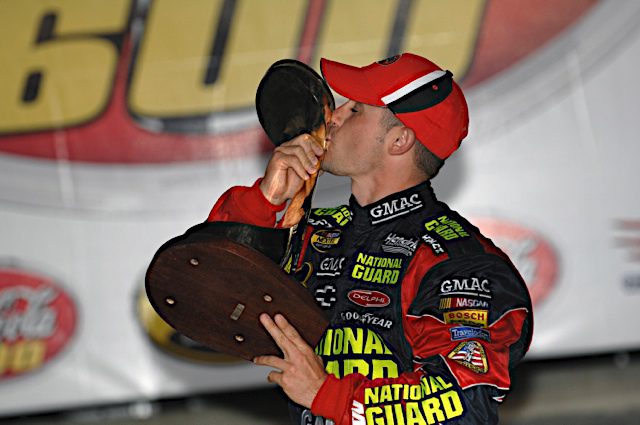Chris Buescher’s second career win came last Saturday night (Sept. 17) at Bristol Motor Speedway, a convincing win as Buescher led 169 laps, more than any other driver, and used what turned out to be a brilliant two-tire strategy on his final pit stop to beat runner-up Chase Elliott to the finish by a healthy .458 seconds.
Buescher did just about everything right, working lapped traffic to his advantage in the closing laps to ultimately seal the deal. The former NASCAR Xfinity Series champion and his team celebrated a win that came over 200 races after his first, just shy of a Cup Series record for races between wins.
But to some fans, it might as well have been Buescher’s first win. That’s because his actual first win, which came at Pocono Raceway in 2016, deserves an asterisk, they say.
But does it?
If there’s anything race fans hate, it’s a win tainted by weather. Many will say it’s not worth as much as a win in which the driver went the full distance to claim the top spot. Oh, unless he went the whole distance to claim the top spot but won because his team made a fuel mileage call. Then that doesn’t count either. First wins get extra bonus scrutiny, too.
Which is absolutely ridiculous.
NASCAR doesn’t put an asterisk in the record books next to a win in a weather-shortened race or a win based on fuel mileage. Why? Because they’re wins, period.
Let’s take a peek at three first wins, spanning the last 15 years or so, that some fans have scoffed at because of the circumstances: the 2007 Coca-Cola 600, the 2016 Pennsylvania 400 and the 2021 Yellawood 500 and the strategies the winning teams employed, as all are different, and the circumstances of each driver’s race and season.
2007 Coca-Cola 600, Charlotte Motor Speedway
The lowdown
Race winner: Casey Mears
Margin of victory: 9.561 seconds
Led: once for six laps
The Coca-Cola 600 is the Cup Series’ longest race, and it’s not unusual for it to come down to mileage, depending on how cautions fall. What makes this race a little unusual is that the mileage game played into the hands of not just Mears, but four others as well, all bigger underdogs than the No. 25.
Charlotte has always had a reputation for being extremely temperature-sensitive, and especially in the 600 as the race starts in daylight and ends well after the sun goes down. The race saw a total of 29 lead changes among 15 drivers.
The dominant car in the early going was the No. 2 of Kurt Busch, who led twice for 107…
Click Here to Read the Full Original Article at Frontstretch…

